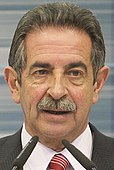| |||||||||||||||||||||||||||||||||||||||||||||
All 39 seats in the Parliament of Cantabria 20 seats needed for a majority | |||||||||||||||||||||||||||||||||||||||||||||
|---|---|---|---|---|---|---|---|---|---|---|---|---|---|---|---|---|---|---|---|---|---|---|---|---|---|---|---|---|---|---|---|---|---|---|---|---|---|---|---|---|---|---|---|---|---|
| Opinion polls | |||||||||||||||||||||||||||||||||||||||||||||
| Registered | 476,924 | ||||||||||||||||||||||||||||||||||||||||||||
| Turnout | 348,377 (73.0%) | ||||||||||||||||||||||||||||||||||||||||||||
| |||||||||||||||||||||||||||||||||||||||||||||
| |||||||||||||||||||||||||||||||||||||||||||||
The 2003 Cantabrian regional election was held on Sunday, 25 May 2003, to elect the 6th Parliament of the autonomous community of Cantabria. All 39 seats in the Parliament were up for election. The election was held simultaneously with regional elections in 12 other autonomous communities and local elections all throughout Spain.
Both the People's Party (PP) and the Spanish Socialist Workers' Party (PSOE) lost 1 seat each to the Regionalist Party of Cantabria (PRC), which won 8 seats. As neither had won an absolute majority, the PRC reinforced its position as parliamentary kingmaker, able to give the government to either of the two parties.[1] The PRC, in a coalition with the PP since 1995, announced that it was not renewing the pact a third time due to "deteriorating relations" between both parties after 8 years of government, and that it would instead seek an alliance with the PSOE.[2]
As a result of the election, PSOE and PRC reached a coalition agreement in which Miguel Ángel Revilla from the PRC was to be elected as regional President.[3]
- ^ "The regionalists, again key in forming a government in Cantabria" (in Spanish). El País. 2003-05-26.
- ^ "The PP acknowledges its loss of Cantabria as opposition pact grows likely" (in Spanish). El País. 2003-06-04.
- ^ "The regionalists rob the presidency of Cantabria from the PP and will govern with the PSOE" (in Spanish). El País. 2003-06-05.


